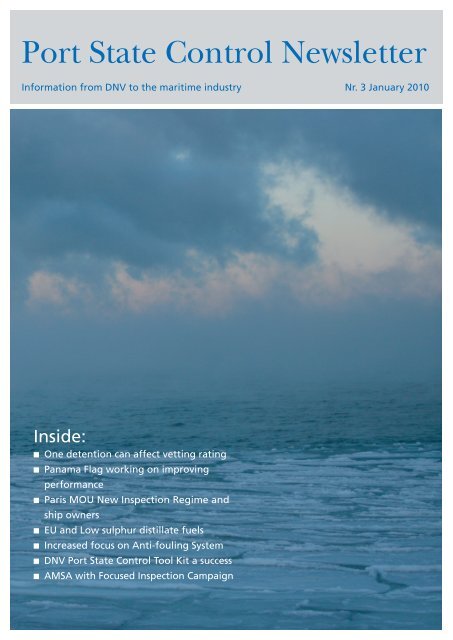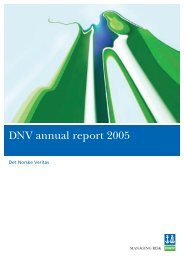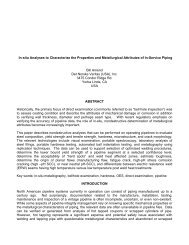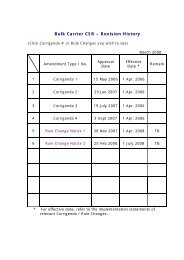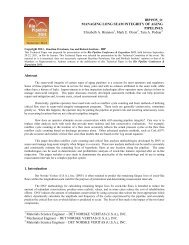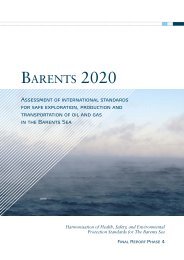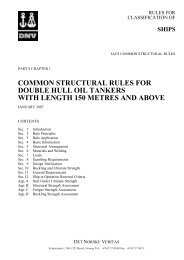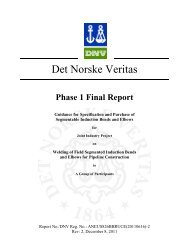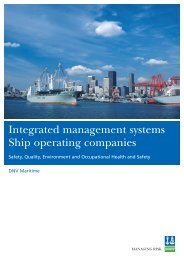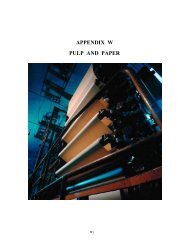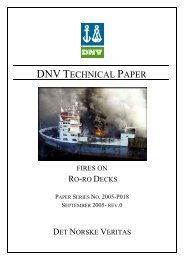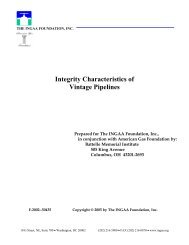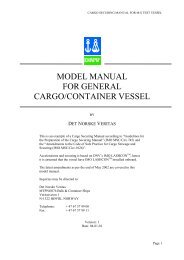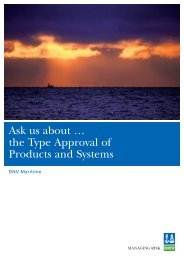PSC Newsletter 3 - DNV
PSC Newsletter 3 - DNV
PSC Newsletter 3 - DNV
Create successful ePaper yourself
Turn your PDF publications into a flip-book with our unique Google optimized e-Paper software.
Port State Control <strong>Newsletter</strong><br />
Information from <strong>DNV</strong> to the maritime industry<br />
Nr. 3 January 2010<br />
Inside:<br />
■ One detention can affect vetting rating<br />
■ Panama Flag working on improving<br />
performance<br />
■ Paris MOU New Inspection Regime and<br />
ship owners<br />
■ EU and Low sulphur distillate fuels<br />
■ Increased focus on Anti-fouling System<br />
■ <strong>DNV</strong> Port State Control Tool Kit a success<br />
■ AMSA with Focused Inspection Campaign
NEWS<br />
This is the 3rd Edition of the Port State Control <strong>Newsletter</strong> published by<br />
Det Norske Veritas. The <strong>Newsletter</strong> is made to provide seafarers and shore side<br />
management in shipping companies with relevant information related to Port<br />
State Control Activities around the world. Enjoy your reading.<br />
ONE DETENTION CAN AFFECT<br />
VETTING RATING<br />
A vessel was detained in mid 2009 with findings<br />
related to fire dampers in the engine<br />
room, and released by the Port State Control<br />
the same day.<br />
Owners have now been informed by<br />
vetting that the vessel is rated with 2 stars<br />
(before she had 5 stars). The low rating<br />
is due to this detention and a port state<br />
control inspection 5 months later (with 8<br />
non-detainable deficiencies).<br />
It was further advised that this rating will<br />
not be changed until 12 months after the<br />
vessels detention and the time charterer is<br />
now reporting that it is impossible to find<br />
a charterer which is willing to use the vessel<br />
with such low rating.<br />
PANAMA FLAG WORKING ON<br />
IMPROVING PERFORMANCE<br />
Panama Maritime Authority issued in<br />
October 2009 two Marine Notices to inform<br />
that any Panamanian vessel which was<br />
detained by a member state of the Paris<br />
MOU (until the end of 2009) could on a case<br />
by case basis face cancellation of the registry.<br />
See their Marine notice 001-2009 and<br />
002-2009 for more detailed information.<br />
This was done in an effort to improve the<br />
detention statistics for the Panamanian Flag<br />
within Paris MOU for 2009.<br />
SAFETY ALERTS BEING ISSUED<br />
FOR LIFEBUOYS<br />
The European Commission has issued a<br />
warning that lifebuoys of the makers<br />
“Altura”, “Eval” and “Cosalt” may be<br />
defective. The defects cause the lifebuoy<br />
to be filled with water, loose buoyancy and<br />
sink when thrown into the sea. Lifebuoys<br />
with hard shell and foam inside, should be<br />
checked with respect to buoyancy. It should<br />
be checked that the lifebuoys are not filled<br />
up with water inside (tip; check the weight)<br />
and that there are no cracks or holes in the<br />
shell (visible or under reflective tape). If a<br />
lifebuoy is found not in compliance, or if<br />
in doubt that it complies, it should be replaced.<br />
Several EU member states are now<br />
issuing safety alerts. See MCA webpage<br />
(www.mcga.gov.uk) and safety Alert no 26.<br />
CONCENTRATED INSPECTION CAMPAIGN<br />
The next Port State Control “Concentrated<br />
Inspection Campaign” (CIC) planned<br />
for 2010 in Paris MOU, will be related to<br />
tanker damage stability. Expect to be asked<br />
during inspections to produce proof of<br />
compliance with damage stability for the<br />
relevant loading conditions.<br />
In 2009 the CIC was related to lifeboats<br />
and launching appliances and results shows<br />
that one in five ships examined by the Paris<br />
MoU was found to have deficiencies regarding<br />
launching of the lifeboats.<br />
5,749 inspections were conducted<br />
resulting in 246 detentions. One in eight<br />
lifeboat launching drills was not performed<br />
satisfactorily. Lack of training seems to be<br />
the main reason. The safety management<br />
systems relating to lifeboats were found<br />
insufficient in one out of 6.<br />
For more information see:<br />
www.parismou.org.<br />
With reference to damage stability in an emergency<br />
situation, be advised that <strong>DNV</strong> offer an “Emergency<br />
Response Service” to support vessels where damage<br />
stability calculations are necessary. All ship types<br />
are included, not just tankers, and enrolling<br />
into the service is easy but needs to be done in<br />
advance to prevent delays during an incident.<br />
The service provides calculations of any possible<br />
loading conditions (intact or damaged), and<br />
can verify compliance with damage stability for<br />
various loading conditions also outside of<br />
emergencies.<br />
Don’t rely on that the Master will have<br />
time to carry out all the necessary damage<br />
stability calculations in the middle of a<br />
stressful emergency. The <strong>DNV</strong> Emergency<br />
Response Service is available 24/7 to<br />
support your vessel.<br />
Contact ERS@dnv.com to enroll.
NEWS<br />
HOW WILL THE NEW INSPECTION REGIME IN PARIS MOU AFFECT SHIP OWNERS?<br />
The application of the New Inspection Regime (NIR) in Paris MOU will start on 1/1/2011, while data collection for the new targeting<br />
criteria and banning procedures have already begun. The performance of the company will be part of the targeting of which ships shall<br />
be selected for Port State Control inspections. The equations used for calculating company performance takes into consideration the<br />
number of deficiencies in the inspections on the vessels under management, and how many detentions the company has experienced (in<br />
the last 36 months). Please note that each ISM related deficiency will count as 5 regular deficiencies. Multiple detentions may lead to ban<br />
from operating the vessel within Paris MOU, which can make it hard to obtain charters or sell the vessel.<br />
See Paris MOU webpage for more details (www.parismou.org) on NIR.<br />
<strong>DNV</strong> <strong>PSC</strong> TOOL KIT A SUCCESS<br />
So far close to 3000 Port State Control Tool<br />
Kits have been delivered to ships all around<br />
the world. The <strong>PSC</strong> Tool Kit is a collection<br />
of useful tools for the shipping company.<br />
<strong>DNV</strong> have received very positive feedback<br />
on the <strong>PSC</strong> Tool Kit from both shipping<br />
companies and <strong>PSC</strong> Authorities:<br />
(“.... IT IS TRULY A REMARKABLE DOCUMENT”<br />
WAS COMMENTED BY ONE <strong>PSC</strong> AUTHORITY)<br />
If you need to order Tool Kits for your vessels,<br />
please contact your local <strong>DNV</strong> station<br />
or: portstatecontrol@dnv.com<br />
LOW SULPHUR DISTILLATE FUELS:<br />
EU has issued a new recommendation<br />
(2009/1020/EU) for enforcement actions<br />
against ships which fail to comply<br />
with the requirement to use fuels with a<br />
maximum permitted sulphur content of<br />
0,1 % while at berth. Expect relevant Port<br />
State Control to request those ships to<br />
provide detailed evidence of the steps they<br />
are taking to achieve compliance, including<br />
a contract with a manufacturer and an<br />
approved retrofit plan. The retrofit plan<br />
should clearly state the date of completion<br />
of the adaptation and certification process.<br />
It is advisable that operators that are not<br />
yet in compliance check with the EU ports<br />
before arrival. <strong>DNV</strong> is providing advisory<br />
services to support ship owners in this process,<br />
including approval of retrofit plans.<br />
Please contact your local <strong>DNV</strong> station for<br />
more information.<br />
PORT STATE CONTROL WITH INCREASED FOCUS ON<br />
ANTI-FOULING SYSTEM CERTIFICATE<br />
The IMO Anti-fouling System (AFS)<br />
Convention was completed in 2001 and<br />
started its function already in 2003 – banning<br />
harmful anti-fouling systems on ships<br />
defined as organotin compounds which act<br />
as biocides (poison) in anti-fouling systems.<br />
The Convention requires that Certificate<br />
confirming compliance with the Convention<br />
must be issued at latest 2 years after the<br />
entry into force date (2008-09-17). The EC<br />
Reg 789/2003 adopted the IMO AFS<br />
Convention, but enforced certification<br />
earlier for vessels sailing under European<br />
Community (EC) flag or arriving EC ports.<br />
Recently Det Norske Veritas has noticed<br />
that <strong>PSC</strong> around the world, especially in<br />
EC ports, has increased focus on compliance<br />
with the AFS Convention/EC Regulation.<br />
Vessels run the risk of fines or even<br />
detention if the documents on board do<br />
not comply with the AFS Convention/EC<br />
Regulation.<br />
Documents issued by coating makers are<br />
not in compliance with the requirements<br />
of the AFS Convention/EC Regulation.<br />
AFS Certificates are to be issued by the<br />
relevant Flag or by a Recognized Organization<br />
on behalf of the relevant Flag.<br />
If relevant Flag has ratified the Convention<br />
the vessel shall be issued with a<br />
AFS Certificate and not a Statement of<br />
Compliance AFS no later than 2010-09-17.<br />
For vessels already holding a Statement<br />
of Compliance AFS, <strong>DNV</strong> will replace the<br />
Statement in due time prior to 2010-09-17.<br />
AMSA WITH FOCUSED<br />
INSPECTION CAMPAIGN<br />
Australia Maritime Safety Agency (AMSA)<br />
will starting February 1st and for the next<br />
3 months, carry out a “Focused Inspection<br />
Campaign” (FIC) on Container ships, primarily<br />
concentrating on container securing<br />
equipment. For more information see<br />
Marine Notice 2/2010 (www.amsa.gov.au).<br />
<strong>DNV</strong>’S PORT STATE CONTROL CAMPAIGN<br />
SHOWS RESULTS.<br />
In early 2009 <strong>DNV</strong> announced the start up of a campaign aimed at<br />
reducing the number of detentions with <strong>DNV</strong> classed ships. The<br />
internal <strong>DNV</strong> records for 2009 shows that the campaign is on the<br />
right track, with a 41% reduction in “class related” detentions and<br />
a total reduction in frequency of detentions around the world with<br />
14% (2009 vs. 2008 figures – all MOUs).<br />
Ship owners may have noticed the <strong>PSC</strong> campaign in the form of<br />
the <strong>PSC</strong> Tool Kit being launched, by attending one of the many<br />
<strong>DNV</strong> seminars on Port State Control, or that <strong>DNV</strong> is now raising<br />
awareness by providing related information (such as this newsletter).<br />
<strong>PSC</strong> Detentions of <strong>DNV</strong> Fleet<br />
1
<strong>PSC</strong> seminar in Valparaiso, Chile<br />
<strong>PSC</strong> TRAINING AND SEMINARS<br />
<strong>DNV</strong> arranges a number of Port State Control<br />
training courses and attends seminars<br />
as speakers on topics related to Port State<br />
Control. In 2009 <strong>DNV</strong> held <strong>PSC</strong> courses<br />
all around the world in countries such as<br />
India, Poland, Sweden, Canada, Chile,<br />
Russia, Norway, Iceland, China, Ecuador,<br />
Estonia, Iran, USA, UK, Germany, Malaysia,<br />
Singapore etc. to mention a few.<br />
Kindly contact your local <strong>DNV</strong> station<br />
to request a schedule over courses and<br />
seminars provided in your area this year.<br />
PORT STATE CONTROL - LONG<br />
RANGE IDENTIFICATION AND<br />
TRACKING (LRIT)<br />
Expect that within Paris MOU the Port<br />
State Control Officers will verify that the<br />
record of equipment (Form E,P or C) has<br />
LRIT checked, that a statement of conformity/<br />
conformance test report (MSC.1/<br />
Circ.1296) is on board.<br />
Detainable deficiencies include absence of<br />
a valid LRIT conformance test report.<br />
Workshop with <strong>PSC</strong> in Ningbo, China<br />
<strong>PSC</strong> course in New Jersey, USA<br />
If you need to order <strong>PSC</strong> Tool Kits for<br />
your vessels, please contact your local<br />
<strong>DNV</strong> station or order on:<br />
portstatecontrol@dnv.com<br />
<strong>PSC</strong> training in Vancouver<br />
<strong>PSC</strong> seminar in Gøteborg, Sweden<br />
<strong>PSC</strong> training in Teheran, Iran<br />
<strong>PSC</strong> training in Mumbai, India<br />
<strong>PSC</strong> in Dublin, Ireland, receiving a copy<br />
of the <strong>DNV</strong> <strong>PSC</strong> Tool Kit<br />
Det Norske Veritas<br />
NO-1322 Høvik, Norway<br />
Tel +47 67 57 99 00<br />
www.dnv.com<br />
<strong>DNV</strong> Port State Control Activities<br />
Niki Ioannidou Mowinckel<br />
Aleksejs Alosins<br />
Jan Solum (editor)<br />
portstatecontrol@dnv.com<br />
Telephone: + 47 67 57 82 10<br />
Telephone: + 47 67 57 82 68<br />
Telephone: + 47 67 57 71 95<br />
Team Members are:<br />
www.dnv.com


